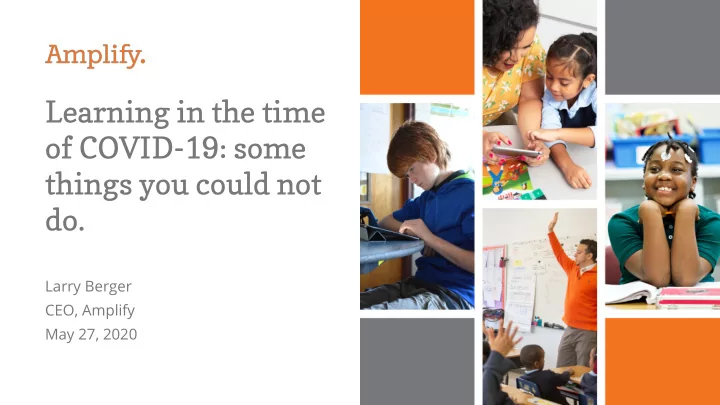

Learning in the time of COVID-19: some things you could not do. Larry Berger CEO, Amplify May 27, 2020
Three fewer things to do 1. Start the year with grade-level content and skills. Let technology support more of the missed instruction, especially in early literacy and math. 2. Don’t overdo assessment at the start of the year; consider some lightweight ways to combine assessment, instruction and SEL. Give kids a chance to process what they’ve experienced and re-engage with school, especially in MS and HS. 3. Make the hard decisions about what content you are going to cut. To do this, identify what content matters most from missed learning this spring and compressed learning this coming fall. 2
3
Starting Points: a better approach to understanding student needs Start of the school is year is always vital for ● nurturing a positive student mindset Educators will want to assess students at the start ● of the school year, for diagnostic and benchmarking purposes, but starting with conventional assessments risks demoralizing at-risk students Building a new approach to understanding student ● needs in a way that values their lived experience and helps teacher establish trust with the student 4
Starting Points: basic structure A short ( 30 minute) reading and writing exercise for students entering grades 6-9 designed ● to function as both: Social-Psychological Intervention ○ Information gathering activity for teachers about their individual students, both ○ socio-emotional clues and reading/writing skills Students select a very short text , then write a personal essay in response ● A ligns to the specific cultural backgrounds and assets of their students ● Item bank of short reading texts with excerpts and quotes from popular music, shows ○ and celebrities (e.g. Chance the Rapper, JK Rowling, Steph Curry, Khloe Kardashian) and cultural figures (e.g. Maya Angelou, Langston Hughes) Writing prompts that help students focus on their own core values and cultural assets ○ (rather than starting with learning deficits or dwell on missed instructional opportunities) Supports for teachers on how to analyze responses, provide supportive and meaningful ● feedback, plan next steps, and administer check-ins using this framework throughout the year
Amplify Science@Home @Home videos @Home units
Recommend
More recommend